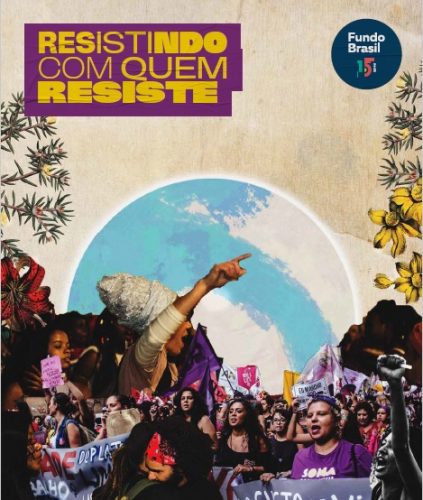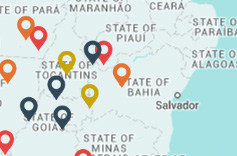 Some of the victories the work of Brazil Human Rights Fund has helped organised civil society to achieve over these last 15 years, celebrated in 2021, include: increased protagonism among activists and social movements countrywide; the emergence of new collectives; strengthened agendas and the formation of discussion networks and cooperation among organisations.
Some of the victories the work of Brazil Human Rights Fund has helped organised civil society to achieve over these last 15 years, celebrated in 2021, include: increased protagonism among activists and social movements countrywide; the emergence of new collectives; strengthened agendas and the formation of discussion networks and cooperation among organisations.
The publication Resisting Together, released on Friday 21 December, is an attempt to weigh up and present some of the results of this work, through the stories of the groups, collectives and organisations supported by Brazil Fund over the years. Their activities have helped transform lives and to push for the defence of human rights in Brazil, within the context of their own regions and agendas.
CLICK HERE TO READ THE PUBLICATION NOW
With articles containing the accounts and analyses of around 30 human rights groups from around the country, the publication Resisting with Those Who Resist is a deep dive into discussions on four specific agendas:
“Increasing the Debate on Race” looks into the history of tackling racism in the country and the historic efforts of black women and men in victories like racial quotas in universities. Incidentally, this law is to be discussed again in 2022. “For decades, only the black movement was talking about the genocide experienced by the black population in Brazil” says the activist Lúcia Xavier, a long-standing leader and coordinator at the NGO, Criola. “Society has changed. Nowadays, the antiracism scene is much bigger in Brazil”, she says.
“Justice stemming from the grassroots level” looks into topics such as the strengthening of family members and friends of people in prison and helping them to organise in order to denounce and tackle the violence and torture suffered by this community within the prison system, as well as the racism that is underpins mass incarceration. Groups are currently forming at the state level, that are dedicated to the prison abolition agenda, under the umbrella of the Agenda Nacional Pelo Desencarceramento (the National Agenda for Prison Abolition). “This proximity is good and gratifying because we are managing to advise and raise awareness regarding people´s rights”, says Priscila Serra, at the Frente Estadual Pelo Desencarceramento do Amazonas (Desencarcera-AM) (State Organisation for the Abolition of Prisons in the Amazon Region).
According to the retired judge, Kenarik Boujikian, “the role of Brazil Fund is to foster the promotion of the human rights of vulnerable communities, like those in the prison system”. Kenarik, who is a Brazil Fund advisor, stresses that in the face of the current challenges, with proposed bills to set the country back, it is even more important to acknowledge and support this type of work. “The actions of these organisations are so dignified, hard-hitting, intense and passionate that they have become the driving force for building human rights”, She adds.
“Defending the lives that defend rights” investigates a serious contemporary matter: threats to the life and integrity of human rights defenders. This agenda is becoming increasingly central to the work of Brazil Fund. A call for proposals to provide support to organisations that want to improve protection and safety procedures for their activists is open for registration until 4 February 2022. This article provides figures that reveal how indigenous leaders are particularly under threat.
The challenges imposed on the field of human rights by the Covid-19 pandemic and its effects are discussed in “Survival First”, which is the last report in the publication. The work of groups that mobilised to feed people, to promote public health safety and save lives and which received support from the Covid-19 Emergency Fund is presented in the publication. Some of them, like the Casa Nem, in Rio de Janeiro and the Associação de Mulheres Indígenas do Alto Rio Negro (Indigenous Women´s Association of the Alto Rio Negro), in the Amazon, even managed to foster alternative ways of generating income in their communities using the small resources they received to confront Covid.
The publication also contains the superintendent of Brazil Fund, Ana Valéria Araújo´s thoughts on the foundation´s journey over these 15 years, as well as an essay on human rights in Brazil today and in the future, based on conversations with five members of the Brazil Fund Administrative Board: Darci Frigo, Jurema Werneck, Mafoane Odara, Rafael Lins Bezze and Susy Yoshimura.
“There is a qualified movement that is ready to build a future rooted in human rights. We are seeing this in the profiles of the groups receiving Brazil Fund support”, Rafael Linz Bezze says.
Editorial coordination of the magazine Resisting Together is by Maitê Freitas and articles are by Aline Rodrigues, Camila Lima, Laís Diogo and Thiago Borges, from Periferia em Movimento; Helena Indiara and Naine Terena; Sanara Santos and Vanessa Cancian.
Human rights on video
The causes discussed in the magazine Resisting Together were also the theme of the I Am You Festival, a series of debates held by Brazil Fund in partnership with Sesc São Paulo, from 8 to 10 December.
The themes of “Racism in Brazil: who is fighting on a daily basis?”, “Justice in Brazil: a system that violates rights?” and “Human Rights Defenders in Brazil: the challenges in fighting for democracy” were discussed during three discussion panels, attended by the Brazil Fund team and activists representing groups that are fundamental to each of these matters.
All of the videos below are in portuguese.
“Racism in Brazil: who is fighting on a daily basis?”
“Justice in Brazil: a system that violates rights?”
“Human Rights Defenders in Brazil: the challenges in fighting for democracy”







